iimhl-cairns-indigenous-exchange_group-discussion-1024x580.jpg
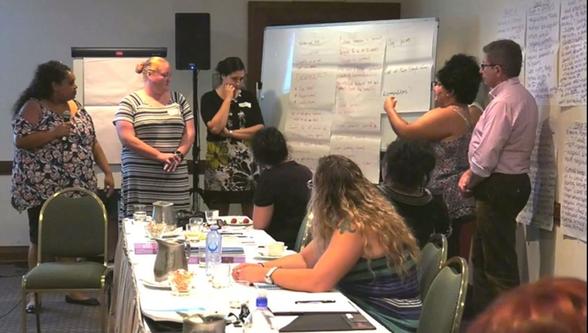
Local, national and international mental health leaders share successful approaches and practices to Indigenous mental health at the IIMHL Match in Cairns.
Commissioner's Update
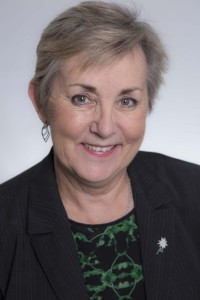
Seeking justice
Some of you will have seen the QWeekend article about the women who were in Wolston Park as children.
I am pleased that Minister for Health Cameron Dick MP responded to my request in mid-2016 and has asked Queensland Health to get a formal reconciliation process underway. I am hopeful that the people affected will see action in the near future.
The delay from when this issue was raised in the media, to a formal apology in 2010, to formal reconciliation in 2017 is clearly unacceptable.
I have met several women who were in Wolston Park as children. Their stories are tragic. They are brave and determined. They fight for justice not just for themselves but for others who have passed away.
These women were excluded from a redress scheme that came out of Queensland’s Forde Inquiry because they were in an adult institution not a children’s institution, even though they were children in the care of the state at the time.
While we cannot undo the past, we must do everything we can to improve their futures. The whole community and the professional groups who allowed their treatment to occur must learn from their stories and prevent similar abuses happening again.
#wolstonwomen if you want to show your support.
International leaders come together
International leaders came together in Australia for the International Initiative for Mental Health Leadership (IIMHL) Exchange.
Although based in Sydney, matches were held throughout Australia and New Zealand. We were pleased to partner with the National Aboriginal and Torres Strait Islander Leadership in Mental Health (NATSILMH) and Queensland Health for the Cairns match ‘Healing and empowerment: Indigenous leadership in mental health and suicide prevention’.
Read the media release
Mental Health Commissioners meet
The Mental Health Commissioners of Australia took the opportunity to meet while in Sydney for the IIMHL Leadership Exchange.
We renewed our Memorandum of Understanding which set out the commitment of all parties for a collaborative relationship and recognised each of our complementary roles and shared commitment to improving mental health and wellbeing.
Download a copy of the Memorandum of Understanding
NDIS and mental illness: Our submission
We made a submission to the Parliamentary Inquiry into the provision of services under the NDIS for people with psychosocial disabilities related to a mental health condition.
While the NDIS has the potential to bring about positive life changes for many people experiencing mental illness, we have significant concern that without careful planning some people with mental health issues may be adversely impacted. Impacts include the pace of transition and the expectation that the NDIS can replace important ‘safety net’ community programs that help build independence, within a recovery framework.
Read our submission and others on the Inquiry website
Maintaining community confidence in Mental Health Review Tribunal
You may have seen recent media attention surrounding the Mental Health Review Tribunal.
The Commission supports the Minister for Health’s decision to retrospectively ensure the validity of decisions taken by the Tribunal. While inappropriate to discuss matters referred to the Queensland Crime and Corruption Committee, it is vital that confidence in the Tribunal is maintained to ensure effective oversight of decisions affecting vulnerable Queenslanders, in particular whether or not they should continue to be subject to an Involuntary Treatment Order.
Read more in my media statement
Congratulations Dr Louise Byrne
Congratulations to Dr Louise Byrne for receiving a Fulbright Postdoctoral Scholarship which will see her continuing her important research at America’s Yale University next year and with RMIT for a three year Research Fellowship.
Louise is a Lived Experience Academic with CQUniversity. She has worked with us on a number of our projects related to meaningfully engaging with people with a lived experience, their families, carers and support people.
Read more about Louise’s work and the scholarship
Strategic Plan review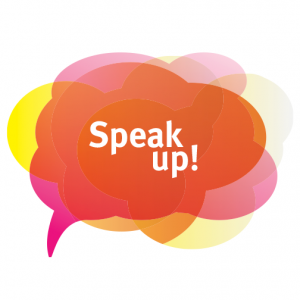
Share your views and experiences
Consultations are open to renew the Queensland Mental Health, Drug and Alcohol Strategic Plan 2014–2019.
The renewal is aimed at continuing sustainable reform and progress towards improving the mental health and wellbeing of all Queenslanders. This includes achieving better outcomes for people living with mental illness, problematic alcohol and other drug use, and people affected by suicide.
It is vital we hear your views to better understand and shape a renewed Strategic Plan. To have your say:
- respond to the discussion papers
- participate in a consultation forum
If you are unable to come to a consultation forum, share your views and experiences by responding to the discussion papers.
Your views are important.
Go to our website to get involved or to register to attend a forum.
Community
Grant funding boosted
Additional funding for community initiatives that improve the mental health and wellbeing of vulnerable Queenslanders has been provided through our Stronger Community Mental Health and Wellbeing Grants Program.
A further nine organisations will receive a total of just under $370,000 to implement innovative, locally-led, collaborative initiatives. This brings the value provided under our 2016-17 grants to more than $1 million.
The latest round of grants support initiatives that focus on the needs of vulnerable groups including Aboriginal and Torres Strait Islander peoples, culturally and linguistically diverse communities, and people with intellectual disability, as well as families and carers of people living with or impacted by problematic alcohol and other drug use.
Read about the grant recipients in our media release
Advisory Council
February meeting
The Queensland Mental Health and Drug Advisory Council met for the first time in 2017.
On the agenda:
- coronial inquests and support for families involved (with guest Deputy State Coroner John Lock)
- Mindframe National Media Initiative and Conversations Matter projects (with guest Jaelea Skehan, Director of the Hunter Institute of Mental Health)
- renewing the Strategic Plan
- release of the Annual Implementation Report 2015–16 and 2016 Performance Indicators Report
- supporting social outcomes through employment
- Queensland Government apology to those who as children were placed in adult mental health facilities
- implementation of the Mental Health Act 2016 and Independent Patient Rights Advisers
- submission on the draft Fifth National Mental Health Plan
- NDIS funding.
The meeting communique will be available on our website soon.
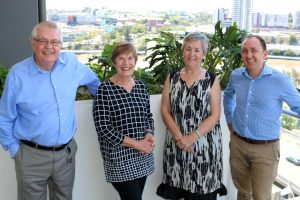 Positive legacy of outgoing members
Positive legacy of outgoing members
The Council has farewelled four of its founding members as they successfully completed their three-year term.
Our sincere thanks go to outgoing Deputy Chair Jan Kealton and council members Kingsley Bedwell, Mitchell Giles and Etienne Roux for their valuable contributions to improving mental health and wellbeing.
Each generously gave their expertise and time to advise and support the Commission and have been important contributors during our first years of operation, including helping establish our work program and networks.
Read about their contribution in our media release
Profile: Hamza Vayani
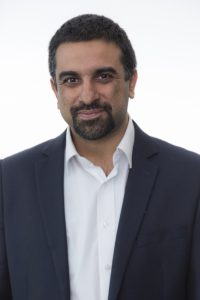 Hamza is a strong advocate for culturally responsive and holistic health, mental health, alcohol and other drug services for people from culturally and linguistically diverse communities.
Hamza is a strong advocate for culturally responsive and holistic health, mental health, alcohol and other drug services for people from culturally and linguistically diverse communities.
While Executive Officer for Mental Health in Multicultural Australia (MHiMA), Hamza’s work focused on advocating for improved service access and delivery outcomes for culturally and linguistically diverse communities requiring mental health services and improving the level of consumer and carer participation through development of the Framework for Mental Health in Multicultural Australia.
Hamza is a member of the Health Consumers Queensland Collaborative. Originally from the UK, Hamza migrated to Australia in 2008 with his wife and two daughters and now lives on the Gold Coast.
Lived experience
Paid participation
We are committed to meaningfully engaging with people with a lived experience, their families, carers and support people as equal partners in our work.
One of the ways we recognise the valuable, specialised and expert contribution made those with lived experience is through paid participation.
Read our renewed Paid Participation Policy
Promoting lived experience
Two significant projects related to engaging people with a lived experience, their families, carers and support people are now complete.
Best practice principles
Best practice principles have been developed for engaging service users in the design and delivery of mental health, alcohol and other drugs services.
The principles were developed by Queensland Alliance for Mental Health, in partnership with Queensland Network of Alcohol and Other Drug Agencies (QNADA) and Enlightened Consultants to:
- provide guidance on the most contemporary practices relating to consumer, family and carer engagement
- develop an engagement framework for mental health and alcohol and other drugs services.
Stretch2Engage helps guide efforts to increase and improve engagement in the mental health and alcohol and other drugs public and non-government sectors. It calls for a different approach to how organisations think about engagement and sets the foundation for culture change which sees engagement as core business.
Read more about the best practice principles
Mapping engagement
The Commission engaged Urbis to undertake a project to map and measure the level, type and range of engagement with service users, consumers, their families and carers in Queensland’s mental health and alcohol and other drug service system, and identify areas of good practice.
Urbis consulted stakeholders through a state-wide survey and face-to-face consultations, including:
- mental health consumers and clients of alcohol and other drug services, their families and carers
- funding bodies, policy makers, and peak organisations
- service delivery organisations and hospitals.
Findings indicate there are some strong practices and mechanisms in place to support engagement as well as some barriers to meaningful engagement.
Together with other research, the project will inform our ongoing work to support and facilitate greater engagement and participation of people with a lived experience of mental illness, suicide or problematic substance use, their families and carers in the planning and delivery of mental health and alcohol and other drug services.
Read more about the mapping engagement project
Mental Health Act resources
New resources are available to help mental health consumers, their families and carers understand the provisions for patients and support persons in the Mental Health Act 2016. Resources include:
- statement of rights
- guides and forms
- brochures
- posters
- fact sheets.
Congratulations to all the people who worked to get these resources in place for the commencement of the Act on 5 March.
Evaluate the national forum
An evaluation of the progress and achievements of the National Mental Health Consumer and Carer Forum is underway.
Requested by the Mental Health Drug and Alcohol Principal Committee of the Australian Health Ministers' Advisory Council, the evaluation includes a poll for people with a lived experience of mental health difficulties, their families, carers and support people. The poll seeks to find out the extent to which mental health consumers and carers throughout Australia know about the Forum and its work.
Take the Consumer and Carer Poll
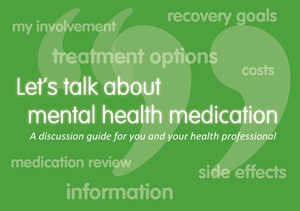 Talking about medication
Talking about medication
A new guide to help people living with mental illness and their families discuss medication with their health professionals has been released by the Mental Health Commission of New South Wales.
The postcard-size discussion guide and accompanying video stories aim to help people feel more confident and informed about medications used to treat mental illness. The guide provides questions to ask your doctor, pharmacist or other health professional covering various topics such as alternative treatment options, side effects, cost, and involvement in decision-making.
Get the discussion guide
System reform
Research: Your service experience
We have engaged the Institute for Social Science Research (University of Queensland) to research the experiences of people with a lived experience of mental health difficulties, mental illness and problematic alcohol and other drug use who have accessed (or attempted to access) human services in North West, Central West and South West Queensland.
The research will identify:
- things that support service users to take up referrals between services
- barriers to service users taking up referrals
- what individuals want, with a focus on meeting their needs holistically
- what good integration and referral processes mean to service users.
The research will involve in-depth interviews with individuals with a lived experience in the three regions, a literature review and a policy analysis.
The project follows our work in 2015–16 looking at integration from the service provider's perspective in the same three regions. In that research, service providers identified the ability or reluctance of a person being referred to take up a referral as a main barrier to integration.
Alcohol and other drugs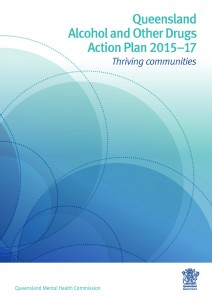
Queensland's progress recognised
According to a recent report Queensland was the best performing state in 2016 in its progress towards preventing and reducing alcohol-related harm.
The Alcohol Policy Scorecard 2017 reported that Queensland had the best policies and implementation score for 2016 (65%) and along with South Australia, performed better than the average jurisdiction across all nine criteria.
Queensland also scored higher than other states and territories (75%) in its whole-of-government strategic plan to prevent and reduce alcohol-related harm—the Queensland Alcohol and Other Drugs Action Plan 2015–17.
Download the Alcohol Policy Scorecard
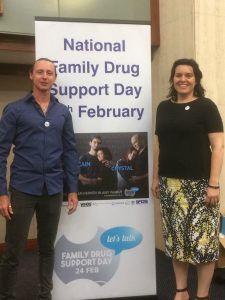 See the person, not the drug
See the person, not the drug
Queensland has taken part in a campaign to end the shame and stigma often experienced by families of people living with problematic alcohol or other drug use.
National Family Drug Support Day on 24 February highlights the need to look past the stigma of drug use and instead see the person who is someone’s son, daughter, sister, brother, mother or father.
As well as seeking to reduce stigma and discrimination for families and drug users, National Family Drug Support Day helps promote support services for families and harm reduction strategies, also key approaches under the Queensland Alcohol and Other Drugs Action Plan 2015-17.
We are supporting a range of Family Drug Support activities over 12 months in South East Queensland and regionally with a $41,500 grant from our Stronger Community Mental Health and Wellbeing Grants Program.
Read more in our media release
Suicide prevention
Supporting MPs to lead on suicide prevention
Members of Parliament developed their understanding of mental illness and suicide at a Mindframe presentation held on 16 February.
The Commission partnered with the Hunter Institute of Mental Health for this presentation, which focused on responsible and accurate representation of mental illness and suicide in the Australian media and in public statements by state and national leaders.
The presentation provided practical advice to Members of Parliament to enable a better understanding of the issues that need to be considered when working with constituents or addressing the media on issues relating to mental illness or suicide.
Guest speaker, Jaelea Skehan, is Director at the Hunter Institute of Mental Health and an internationally respected leader in the prevention of mental illness and the prevention of suicide. She joined Mental Health Commissioner Dr Lesley van Schoubroeck and suicide prevention advocates and Members of the Queensland Mental Health and Drug Advisory Council, Martina McGrath and Kerrie Keepa.
Read more about the national Mindframe initiative at www.himh.org.au
Wesley LifeForce Suicide Memorial Day
‘Losing a loved one to suicide is a sorrow unlike any other, but you are not alone.’
Wesley LifeForce Suicide Memorial Day is on 16 March 2017.
To mark the day, each year Wesley LifeForce holds a memorial service in Brisbane, for those affected by suicide to come together in a spirit of comfort and hope. All are welcome to attend.
Find out more about the Brisbane Memorial Service
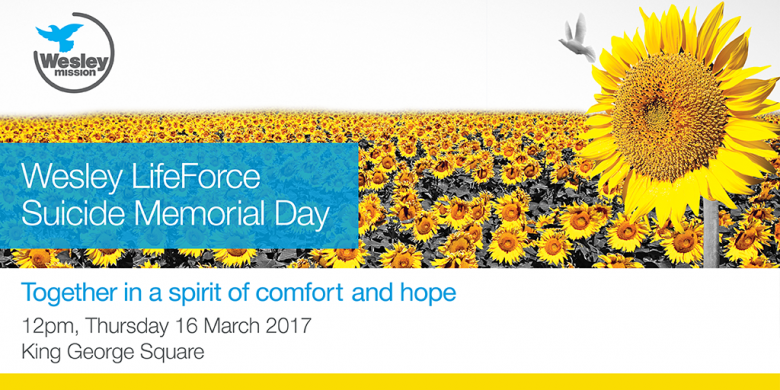
Partnerships
Consent to mental health treatment and care
The Mental Health Act 2016 commenced operation on 5 March 2017 and there are several important differences which impact upon the roles and functions of the Office of the Public Guardian (OPG), particularly in relation to its Guardianship, Investigation and Community Visitor programs.
One of the main impacts relates to a new role for the Public Guardian being requested to consent to treatment and care under the Act’s ‘less restrictive way’ process. As such, the OPG has produced a new Policy on the Consent to Mental Health Treatment and Care by the Public Guardian. This policy clarifies the position of the Public Guardian and applies to adults for whom the Public Guardian is appointed as guardian/attorney for, and is providing consent to mental health treatment and care.
The OPG has established a section of the OPG website dedicated to the Mental Health Act 2016 and its impacts. Any queries regarding the Act and OPG that are not answered on their website should be directed to MHA@publicguardian.qld.gov.au.
Sector News
Human rights forum
Walk the Talk: Realising the 2010–2020 National Disability Strategy and our human rights promises
Queensland Advocacy Incorporated and Griffith University invite you to explore the burning issues that prevent the realisation and protection of basic human rights for people with disability.
We are proud to be sponsoring this human rights forum which will consider the progress Australia has made as we pass the half-way point in COAG’s 2010-2020 National Disability Strategy and how far we have yet to go. The National Disability Insurance Scheme will also feature strongly.
The forum will bring together people with disability, their families, researchers, professionals and committed citizens to ask challenging questions and identify some answers.
Mental Health Commissioner Lesley van Schoubroeck will facilitate the afternoon panel discussion.
Grants
- Greater Charitable Foundation — Each year the Foundation provides around $1 million to NSW or South East Queensland programs which are designed to improve the life outcomes of their beneficiaries. The two key priority areas for funding are Families and Communities. Apply
- Mercy Foundation Social Justice Small Grants Program — Small grants for a range of social justice and community initiatives available to not-for-profit organisations. Read more
- ANROWS Research Priorities 2017-19 Grants round — To support implementation of the National Plan to Reduce Violence against Women and their Children 2010-2022 and reflect the priorities of the Third Action Plan. Find out more
- Stockland Community Grants — Grants of up to $1,000 available to support local health, leisure and recreation clubs or programs, local employment, education and skills development initiatives and social engagement clubs and programs from participating Stockland retail centres, residential communities and retirement living villages. Apply here
- Nambour RSL Community Benefits Grant Fund — Up to $5,000 grants available to community groups in the Nambour area. Download the guidelines and application form
- Moreton Bay Region Community Grants — To recognise leadership and individual achievement, and to develop and actively support community organisations and individuals to positively contribute to community wellbeing and the cultural life of the region. Find out more
- Noosa Council's Community Grants — Grants to help organisations and individuals meet community needs, build community skills and resilience and develop and maintain community infrastructure. Read more
- Small Grants for Rural Communities — Up to $5,000 available for projects and activities that offer clear public benefit for communities in rural, regional or remote Australia. Priority is given to communities of 10,000 or fewer. Apply here
- Commonwealth Bank Community Grants — $2 million in grants of up to $10,000 to youth-focused organisations across Australia. Find out more
- Queensland Seniors Week — Community organisations and councils across Queensland can apply for subsidies of up to $1,000 to help fund local events during Seniors Week 2017 (19-27 August). Apply for a subsidy
Resources
- Reword — A new online tool to help protect young people from becoming victims of cyberbullying. Reword works by identifying cruel or intimidating language in real time, prompting users to reconsider their potentially hurtful message or social media post before hitting send. Download Reword
- The value of peer operated service — A Social Ventures Australia analysis of a 100 per cent peer operated mental health service run by Flourish Australia in Hervey Bay, Queensland. Read the article
Events
- 15 March 2017 Sunshine Coast and Gympie Suicide Prevention Forum — PHN Central Queensland, Wide Bay, Sunshine Coast has joined with community partners to better understand how we can reduce and prevent suicide within our community through a united approach based on the evidence of what works. Register here
- 23-24 March 2017 ADA Australia Human Rights Conference — Gold Coast. ADA Australia’s inaugural conference themed Human Rights and Social Justice: Shifting Client Control. Early bird registrations now open. Register
- 24-26 March 2017 4th International Medicine in Addiction Conference — Sydney. The premier addiction conference for medical practitioners and allied clinicians in Asia and Oceania. Read more
- 6-7 April 2017 Interpersonal Psychotherapy for adolescents and adults — A two-day intensive skill development opportunity for clinicians with prior experience of IPT. Information and registration
- 26-29 April 2017 14th National Rural Health Conference — Cairns. Australia’s pre-eminent event for everyone committed to better health and wellbeing in rural and remote communities. Keynote speakers include Queensland Mental Health and Drug Advisory Council member Mark Wenitong and former member Professor Gracelyn Smallwood. Find out more
- 4-5 May 2017 Towards Elimination of Restrictive Practices 11th National Forum — Perth. The theme for the 2017 forum is Working together, a culture of care. Register
- 15-17 May 2017 Australian and New Zealand Addiction Conference — Gold Coast. Covering topics surrounding prevention, treatment and recovery, the 2017 Conference will include presentations from leading sector specialists, researchers, psychologists and medical practitioners. Early bird registrations are open. Register here
- 18 May 2017 Health Consumers Queensland Annual Forum — ‘Power and Passion: Culture change through consumer engagement and partnerships’. Register
- 22-23 May 2017 Australian and New Zealand Disaster and Emergency Management Conference — Gold Coast. The Conference will address planning, response and review the latest research in the management of disasters, emergencies and hazards. Topics will include understanding and enhancing resilience and psycho-social implications of disaster management. Register
- 26 May 2017 Brisbane Mental Health and Wellbeing of Young People Seminar — This year Generation Next’s seminar will cover preventing depression, managing anxiety, mental health first aid, supporting a young person in their decision not to drink, understanding and managing anger and aggression and much more. Go to the seminar website
- 30 June – 1 July 2017 Inaugural Australasian Mental Health and Higher Education Conference — An international conference open to researchers, practitioners, educators and students working in the higher education mental health space. Go to the conference website
- 27-28 July 2017 Australian Winter School Conference — Explore the complex intersection alcohol and other drugs have with other sectors with the themes of Collaborate, Coordinate and Integrate at the 2017 AWS Conference. More information at winterschool.org.au
Surveys
- Act on Alcohol Survey 2017 — Help give a clear snapshot of alcohol-related issues being faced in your community. Information is used to help identify local issues needing priority consideration, the types of resources that would help address these concerns and support required to take action. Take the survey
- Education and young people with severe and complex mental health issues — This Health Consumers Queensland survey aims to get the health consumer perspective about the role of education for young people with severe and complex mental health issues. Responses will remain anonymous and be collated into a report for the Queensland Government to help implement their response to the recommendations from the Barrett Adolescent Centre Commission of Inquiry Report. This report will also be provided to the consumer and carer representatives involved in the implementation process. Participate in the survey
Other
- Request for Offer for new AOD Outclient Treatment Services — Queensland Health has released a Request for Offer for suitable non-government organisations to deliver alcohol and other drug psychosocial intervention (outclient) services for the period 1 July 2017 to 30 June 2021 with an optional extension period of 12 months to 30 June 2022. This new package of recurrent funding totals up to $4.25M per annum. Go to QTenders for more information
- 2017 Queensland Reconciliation Awards — Queensland businesses, organisations and educational institutions creating meaningful change towards reconciliation are being encouraged to nominate for the 2017 Queensland Reconciliation Awards and have their valuable work recognised across the State. There’s $25,000 in prize money to be won. Nominations close 20 March. Nominate now
